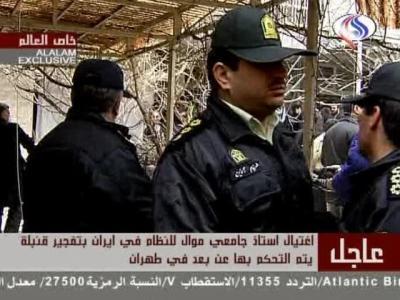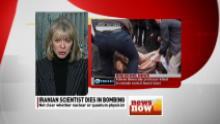TEHRAN, Iran – A senior physics professor who publicly backed Iran's opposition leader was killed when a bomb-rigged motorcycle exploded as he left for work Tuesday. The government blamed the U.S. andIsrael for the attack.
The blast apparently was set off by a remote trigger, but it was unclear why the professor was targeted. The victim was a 50-year-old researcher with no prominent political voice, no published work with military relevance and no declared links to Iran's nuclear program.
Hard-line backers of the Islamic system have urged stronger measures to try to crush and intimidate anti-government forces. But the Tehran University professor, Masoud Ali Mohammadi, was far from a front-row political player.
He joined a list of 240 faculty members in a declaration supporting opposition candidate Mir Hossein Mousavi before June's disputed presidential election, but did not take any known high-profile role in the protests after the vote.
The attack was an oddity in Tehran, where such targeted bombings are rare.
"There's a lot of conflicting and confusing aspects to this," said Mehrzad Boroujerdi, an Iranian affairs expert at Syracuse University. "About the only thing we can probably say is that this may bring lots more pressure on the opposition."
Iran's leadership immediately blamed an armed Iranian opposition group that it said operated under the direction of Israel and the United States. The Web site of Iran's presidential office said President Mahmoud Ahmadinejad ordered an investigation into foreign involvement in the bombing.
In Washington, State Department spokesman Mark Toner said: "Any charges of U.S. involvement are absurd." A U.S. intelligence official said the CIA played no role in the bombing death, speaking on condition of anonymity because he was not authorized to speak publicly on the matter.
Israel's Foreign Ministry had no comment.
It is the third mysterious incident involving an Iranian scientist in recent years.
Researcher Shahram Amiri disappeared in June while on a pilgrimage to Saudi Arabia, raising questions about whether he defected and gave the West information on Iran's nuclear program. Amiri worked at a university linked to the Revolutionary Guard and his wife said he was researching medical uses of nuclear technology at a university.
Iran's foreign minister accused the U.S. of helping to kidnap him and demanded his return.
In 2007, state TV reported that another nuclear scientist, Ardeshir Hosseinpour, died from gas poisoning. A one-week delay in the reporting of his death prompted speculation about the cause, including that Israel's Mossad spy agency was to blame.
Ali Mohammadi, however, had no known ties to Iran's nuclear program — which the West alleges could include a clandestine weapons program. Iran says it only seeks to build energy-producing reactors.
Ali Shirzadian, a spokesman for the atomic agency, told The Associated Press that Ali Mohammadi "was not involved in the country's nuclear program."
His published work — focusing on theoretical physics and the study of subatomic particles — has virtually no military applications, said Michio Kaku, a prominent high-energy physics professor at City College of New York.
"Nuclear physicists interested in bomb-making would have no interest in these papers," Kaku said. "These papers are highly abstract."
Ali Mohammadi had just left his house in northern Tehran's Qeytariyeh neighborhood when the explosion shattered nearby windows.
The semiofficial ISNA news agency quoted Tehran prosecutor Abbas Jafari Dolatabadi as claiming foreign spy agencies were involved.
"Since Ali Mohammadi was one of the scientists of physics and nuclear energy, most probably intelligence services and elements of the Mossad and CIA had a hand in his assassination," the prosecutor said, according to the Web site of state TV. Iran's Foreign Ministry also accused Israel and the U.S. of involvement, the Web site said.
Iran also directed suspicion at the People's Mujahedeen Organization of Iran, an exiled opposition group. Tabnak, a conservative Web site close to Iran's ruling establishment, said the group carried out the attack under direction of Israeli agents.
The People's Mujahedeen denied any involvement and said the claim was a government ploy to smear the group.
The Basij militia — a nationwide force linked to the powerful Revolutionary Guard — condemned the killing and called the professor a martyr. The Revolutionary Guard has led the postelection crackdowns, and the Basij, often riding motorcycles, have been a main attack force on street protesters.
Dozens of people have been killed in Iran's worst internal unrest since the 1979 Islamic Revolution. Last week, pro-government demonstrators fired on the car of Mahdi Karroubi, another leading opposition figure who lost in the election. He was not hurt.
The Basij statement said Ali Mohammadi also taught at the Imam Hossein and Malek Ashtar universities, both linked to the Revolutionary Guard.
In 1992, Ali Mohammadi received a doctorate from Tehran's Sharif University of Technology.
The semiofficial Mehr news agency quoted the head of Tehran University's science department, Ali Moqari, as saying that Ali Mohammadi was not involved in political activity on campus — one of the centers of anti-government organizing.
___
Murphy reported from Dubai, United Arab Emirates. Associated Press Writers Seth Borenstein and Pamela Hess in Washington and Malcolm Ritter in New York contributed to this report












No comments:
Post a Comment